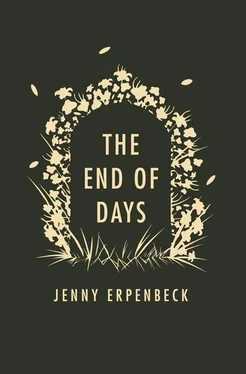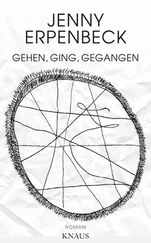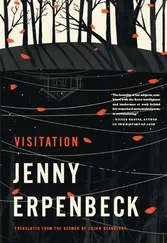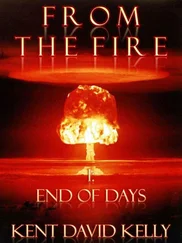Jenny Erpenbeck - The End of Days
Здесь есть возможность читать онлайн «Jenny Erpenbeck - The End of Days» весь текст электронной книги совершенно бесплатно (целиком полную версию без сокращений). В некоторых случаях можно слушать аудио, скачать через торрент в формате fb2 и присутствует краткое содержание. Год выпуска: 2014, Издательство: New Directions Publishing, Жанр: Современная проза, на английском языке. Описание произведения, (предисловие) а так же отзывы посетителей доступны на портале библиотеки ЛибКат.
- Название:The End of Days
- Автор:
- Издательство:New Directions Publishing
- Жанр:
- Год:2014
- ISBN:нет данных
- Рейтинг книги:4 / 5. Голосов: 1
-
Избранное:Добавить в избранное
- Отзывы:
-
Ваша оценка:
- 80
- 1
- 2
- 3
- 4
- 5
The End of Days: краткое содержание, описание и аннотация
Предлагаем к чтению аннотацию, описание, краткое содержание или предисловие (зависит от того, что написал сам автор книги «The End of Days»). Если вы не нашли необходимую информацию о книге — напишите в комментариях, мы постараемся отыскать её.
The End of Days — читать онлайн бесплатно полную книгу (весь текст) целиком
Ниже представлен текст книги, разбитый по страницам. Система сохранения места последней прочитанной страницы, позволяет с удобством читать онлайн бесплатно книгу «The End of Days», без необходимости каждый раз заново искать на чём Вы остановились. Поставьте закладку, и сможете в любой момент перейти на страницу, на которой закончили чтение.
Интервал:
Закладка:
So pleased to meet you.
You speak Russian very well.
Oh, I don’t know.
Truly.
Someone who was a Soviet poet, and she’d have sworn he almost. and with her body. and he would have. and then the two of them. and then, oh. simply given away, what?. all her orifices, thinking constantly of her husband. of course it was out of the question, certainly impossible. and therefore at the crack of dawn, even before he. and all this time there were air raids over Moscow, and later the doctor would have said: a kidney infection, and then she would have evacuated, Kursk Station: four suitcases, war, a train to Ufa. And only there, in the Urals, would she have, not a kidney infection but her sixth month, Moscow stands firm, and the Soviet poet has left for Tashkent, yes, well, the baby, a boy, never an opportunity to tell the poet, never any letters, she never saw him again; Comrade O. produced a cradle for the baby, she wrote more radio programs. scorched earth. writing German for Germans; never an opportunity to tell him, never any letters, he was never there. And her husband, H.? Writing to fend off the German Fascists. never give the enemy a handhold, never overvalue the private fate of the individual. nursed the child for a year and a half while others starved, H. lost forever? And then the breaking free: the immense exertion, the greater the sacrifice made for the cause, the more just the cause must be. The crying baby — truly, it should have been his child, the child of her H. A good article, genuinely important, antifascism and war, a genuinely good program, and her H., genuinely lost forever? A Russian niania for the baby. how do you write your way into the hearts of the German Fascists. the battle of encirclement, Stalingrad stands firm. and if you get in, turn their hearts around inside their bodies? Her child, at three, more Russian than German. And finally the war would have been over, back to Moscow with her four suitcases. And her beloved H. still lost forever in all likelihood, and the distant poet probably still writing poems, in Russian. And her child would have asked, in Russian, where the end of the world was. Her comrades’ invitation, and she thought, why not back to Berlin if it came to that? Her letter to her mother had long since come back to her stamped Evacuated to the East , so she had no family left in Vienna, and probably nowhere else either. In all probability. So: Belorussky Station, to Berlin. Culture work. Rebuilding. And the child: he was still much too young for her to explain to him who his father, or who his real father — even this father too far away to tell him how his son, and that to begin with. besides which, she never wrote any letters, not a single word. A new beginning. Rubble. Sisyphus , finally out of her suitcase and in print.
I want to see my friends!
Who are your friends?
The wolves, the foxes, and the ghosts!
At least he’s still there in Tashkent, or where? The Soviet poet. Never again any news of H. Membership in the Socialist Unity Party. No opportunity to say, or write, and the child not yet able to understand. Her first play performed, a great success: esteemed Comrade H. Could her husband possibly still be alive after all?
Some day when I’m dead, my toys will still be here.
Spare the child all of that.
Your father fell at the Battle of Kharkov.
Or something like that.
Wolves, foxes, and ghosts.
Not one word more.
BOOK IV
1
We must bid farewell to Comrade H., who soon would have completed her sixth decade of life.
He points to one of the wreaths.
All her life she devoted her abilities to serving the working classes and her Party. In her we are losing an exemplary champion of proletarian-revolutionary art.
He writes the text that is to be printed on the ribbon: For my mother.
In black script or gold?
Black.
Born in Brody, the daughter of an Austrian civil servant, she grew up in Vienna and in 1920 became a member of the Communist Party. In 1933 she emigrated to Moscow by way of Prague. There she contributed to the understanding between peoples as a translator of Soviet poetry for the journal Internationale Literatur and immediately after Hitler’s treacherous attack on the Soviet Union began her active antifascist work for the underground radio station operated by Radio Moscow.
Sure, he says, why not have rose petals to toss into the grave?
After returning from exile, she moved to Berlin and here, in her tireless efforts on behalf of world peace and Socialism, she began to publish her first autonomous literary works.
How many?
How many are there usually?
One basket, two baskets, five baskets — depends how many mourners you’re expecting.
Let’s make it five, he says.
Thereafter she made significant contributions to the development of art and culture in the GDR with her important novels, works for theater, stories, reportage and radio plays. This great artist was nearly unmatched in her ability to bring the attention of our People to the world’s most righteous strivings.
2
As she falls, she knows that she is falling, she knows that the railing is already too far away to reach with her left hand (much less the right), and suddenly she remembers the railing on the stairs in Vienna and how huge the eagle at the end of the banister had looked to her as a girl, how the stairwell always smelled of whitewash and dust, all of this occurs to her as she falls, as if memory, too, were a form of falling. Now she really is a “fallen woman” for the first time in her life, and if it weren’t less a laughing matter than a dying one, she’d have to laugh. Did her mother think of her in her final moments? Is this her final moment? Back when she heard Khrushchev’s secret speech broadcast on a West Berlin radio station, she’d suffered a heart attack and survived, so how can she be on the point of death now just because she’s been knocked literally off her feet between one step and the next? The first chapter a tragedy, the second always a farce — had she only read Marx so she’d understand now that this really was the end for her? How do you recognize your final moment? Is it that more thoughts can be thought in it than any other? What is this abyss gaping open before her and swallowing up all the thoughts a person can think, and where was it before? If she tumbles out of life, what will happen to her son?
3
On the morning his mother is incinerated, her son spends two hours at home sitting at the desk in the desk chair where his mother always sat when she was working, and he waits for the time to pass.
Her work was honored with many prestigious prizes and awards by our Republic, including the Comrade-G. Medal, the Great Patriotic Order of Merit, and the Goethe Prize.
The desk chair is covered with blue leatherette and can spin on its axis. Sometimes as a child he would sit on it, spinning in circles until he was dizzy. He doesn’t think his mother ever used this chair to spin on.
Her work in defense of the beautiful and true is her legacy to us all and will inspire us in our struggle to achieve the reunification of our homeland and world peace.
4
Dear Mother, she had written near the end of the war, things are very good with me. I have a son now, he is three years old and is named Sasha. How long had it been since her mother had sent the little box with the gold buttons from her father’s civil-service uniform to her in Moscow? And she hadn’t even thanked her. She’d thought that her mother had just wanted to get rid of her last remaining souvenir of her husband, that her mother didn’t know what it truly meant to love. Then, with the start of the war and her relocation to Ufa, her contact with Vienna had broken off. Only near the end of the war, in Moscow — when she learned through her work at the radio station what had been happening to the Jews in countries defeated by Germany — did she ask herself when her mother’s package had arrived: in 1939 perhaps, or 1940? Dear Mother, things are very good with me. I have a son now, he is three years old and is named Sasha. The letter had come back to her stamped Evacuated to the East. And now, sealed and multiply stamped as it had been when it was returned to her, it lay at the very bottom of her linen cabinet, underneath the sheets. Her son would find this letter sooner or later. Now, she has no secrets left. She cannot protect her son any longer, nor herself.
Читать дальшеИнтервал:
Закладка:
Похожие книги на «The End of Days»
Представляем Вашему вниманию похожие книги на «The End of Days» списком для выбора. Мы отобрали схожую по названию и смыслу литературу в надежде предоставить читателям больше вариантов отыскать новые, интересные, ещё непрочитанные произведения.
Обсуждение, отзывы о книге «The End of Days» и просто собственные мнения читателей. Оставьте ваши комментарии, напишите, что Вы думаете о произведении, его смысле или главных героях. Укажите что конкретно понравилось, а что нет, и почему Вы так считаете.












